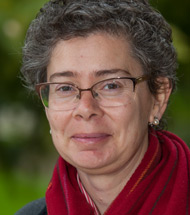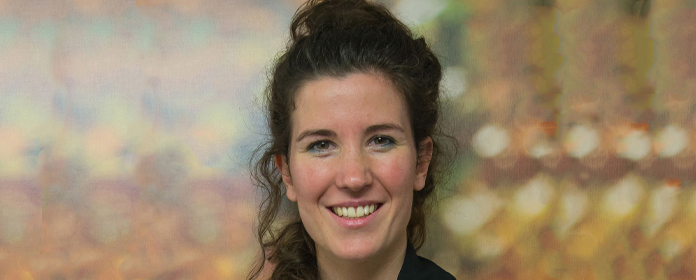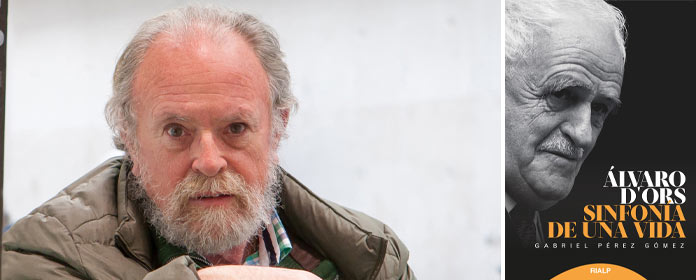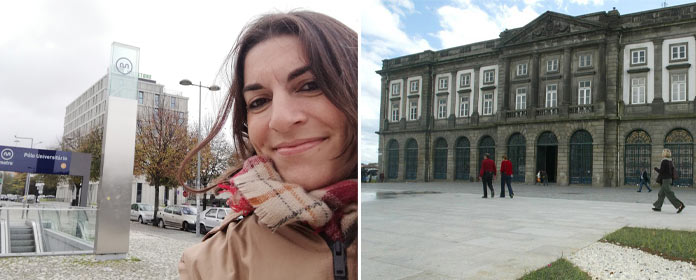"The links we maintain with others have an impact on the training of our identity staff"
Ana Marta González, researcher at Institute for Culture and Society, emphasizes in an ICS workshop that "there is a moral universalism that must be reflected in social life".

PHOTO: Manuel Castells
How are identity staff and social relationships connected is one of the main questions raised in the international workshop 'Social bonds and identity staff'. The activity is part of the project 'Bonds, emotion and identity. The moral dimension of social ties' of the group 'Emotional culture and identity(CEMID) of the Institute for Culture and Society (ICS). It is co-directed by Ana Marta González -principal investigator of CEMID- and José María Torralba and is supported by sponsorship of the Ministry of Economics and Competitiveness.
On the occasion of the workshop, Professor Gonzalez reviews some basic questions about the connection between the self and relationships with others.
What is the relationship between identity staff and social ties?
We are social beings and the ties and relationships we form undoubtedly have an impact on the training identity staff. What we want to explore is what impact our relationality has on the subject of people we become.
In your discussion paper you address the issue of solidarity and social bonds from Kant's perspective. What does this have to do with identity?
We live in very fragmented societies, very individualized, where partly for that reason a subject of bonds is prospering, which from a certain point of view could be characterized as postmodern and artificial. To a large extent, identity movements follow this line. This subject of identities is generating social division and there is a lack of more attention to the social bond as such. In the history of sociological thought this is none other than the question of solidarity. Although it undoubtedly has classical roots, as such it is a modern topic . Reflection on it was born in the context of the French Third Republic (1870-1940), marked by the social division and fragmentation resulting from industrialization and the French Revolution. There, the question of what is the link in such a society emerges with force.
What does Kant's vision contribute today?
The first people to address this issue were inspired by Kantian thought, although he does not speak of solidarity. Kant carries the ideals of the rule of law with equal freedom for all citizens, but he does not forget that social life has to be crossed by moral bonds. In this sense, his message has not lost its relevance. Beyond the group or collective to which each one claims to belong, there is a moral universalism that must be reflected in social life. Kant's message of solidarity is a morally articulated message. It is especially important to highlight it nowadays.
Are there bonds of higher quality and therefore more positive for the shaping of identity?
Thomas Scheff, a sociologist of emotions, distinguished between secure and insecure social bonds. He explained that the latter can occur at the micro-social level - the family or friendships - or at the macro-social level - even in the relationship between nations or states. Scheff himself applied this to the evolution of Third Reich Germany. One typology of insecure social bonds is that in which one of the parties is completely absorbed or alienated by the other, as occurs in many cases of gender violence, although not only there. Other times the opposite phenomenon occurs: one person becomes isolated. In both cases we detect anomalies in the experience of the bond; a healthy one is one in which the personalities remain but at the same time there is a relationship. Neither is healthy that relationship in which the members go their own way and, therefore, the bond is not exercised in the internship.
Individuals receive very different stimuli and messages from the different contexts in which we move. Sometimes they are even negative. How does it affect our self, especially in the case of the younger ones?
We have to come to terms with an undeniable reality: modern societies are highly individualized. Among the sociologists who first addressed this question was Georg Simmel in the early 20th century. He noted that in traditional societies the social whole was homogeneous, there were no great differences between the values absorbed in the family and in society.... In contrast, in modern societies - partly due to the very dynamics of the division of work, of the differentiation of social spheres - we find different social groups and it is normal for a person to develop his or her life in different environments. This is a matter of fact and it is not a question of regretting it, but of understanding it. Otherwise, there is a temptation to isolate. For example, when a child is growing up, we may want to isolate him or her from the environment because we believe that he or she receives negative influences. But society educates or miseducates as much as parents can. Parents have a prior right to the Education of their children, it is true, but sometimes there are cases of distortions. It is important to educate in the management of the multiple influences; that is to educate in freedom and responsibility.
Is it possible to speak of one identity or are we the sum of many identities?
It is true that depending on the contexts there are aspects of your personality that come to the fore, but contexts change at such a speed that it would be ridiculous to magnify these identities. I am in favor of limiting the concept of identity to the training of identity staff because it seems to me that there is something rigid in this concept, something that contradicts the very dynamics of life staff and social. We are always in training. Our subjectivity is - or should be - an open and moldable subjectivity because relationships produce an impact. An excessive use of the concept of identity can be counterproductive. We are seeing this, for example, when it is used as a political weapon.
What is your proposal so that identities are not an obstacle to understanding?
I prefer to speak of subjects, of people who live, who are open to multiple influences, who think. Behind the resource to identities there is an extraordinary mental laziness. People stop thinking: they hide behind an identity. This is the biggest obstacle to talking to others, who may have many interesting things to tell you, and perhaps some of them you would even agree with agreement. Today, identities can be an obstacle to coexistence and growth staff because they prevent thought, criticism and constructive dialogue. They are an expression of fear. And this can be applied to all parties in general, both on the right and on the left. Right now this is one of the most serious problems of our societies. Somehow it is necessary to allude to the irreducible of the person, to what makes the person not only a process, although it is formed and grows in the midst of many processes.
What remains of our identity in the digital world?
Projecting our identity on the web is always a selection process: what we make known about ourselves. Ilaria Malagrino, visiting researcher at project 'Emotional culture and identity', recently remarked how nowadays the topic of modesty, an issue of extraordinary anthropological importance, has moved from the body to the image. People do not show particular modesty when it comes to showing the former, but they do when it comes to the latter. This is indicative of the fact that ours is a society of image: one is at stake in the way one appears to others. What is clear is that our identity is not what appears. The self is closer to what is objectified on a screen or what one decides to show of oneself. Where is my self: in what I write or in the act of writing? Am I in the photos I post of myself on the networks or in the act of posting them? My identity is by no means what is objectified in a Twitter account. Rather, if I had to look for it somewhere, it would be in the decision to make something known, but a very limited fragment of my life. Here is the selection process: with what criteria I choose what appears of me to the public.





